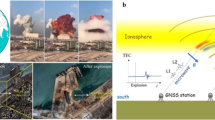Abstract
IN a recent note1, we showed that for oversea paths which were low and non-optical, the received radio field-strength on centimetre wave-lengths was much increased by the presence of low-level atmospheric ducts lying directly on the sea. These ducts, which trap the radiation, appear to have heights of up to about 100 ft. over the sea around the coasts of Britain. The purpose of this note is to show that, whereas such ducts have a pronounced effect on the propagation of centimetre-wave radiation for paths lying predominantly within the ducts, they have little effect on the same wave-lengths when either or both transmitting and receiving aerials are well above the top of the duct, or on metre wavelengths even for the same low paths which show pronounced duct effects on centimetre wave-lengths.
This is a preview of subscription content, access via your institution
Access options
Subscribe to this journal
Receive 51 print issues and online access
$199.00 per year
only $3.90 per issue
Buy this article
- Purchase on Springer Link
- Instant access to full article PDF
Prices may be subject to local taxes which are calculated during checkout
Similar content being viewed by others
References
Nature, 162, 818 (1948).
Ratcliffe. J. A., Nature, 162, 9 (1948).
Author information
Authors and Affiliations
Rights and permissions
About this article
Cite this article
MCPETRIE, J., STARKEY, B. Atmospheric Effects on Short-Wave Radio Propagation. Nature 163, 958–959 (1949). https://doi.org/10.1038/163958a0
Issue Date:
DOI: https://doi.org/10.1038/163958a0
Comments
By submitting a comment you agree to abide by our Terms and Community Guidelines. If you find something abusive or that does not comply with our terms or guidelines please flag it as inappropriate.



